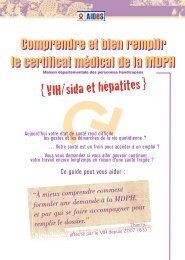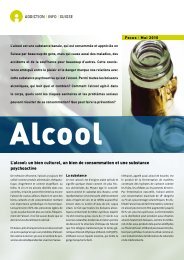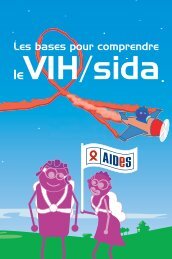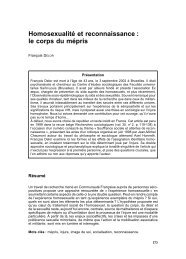Care and support for people living with HIV/AIDS
Care and support for people living with HIV/AIDS
Care and support for people living with HIV/AIDS
Create successful ePaper yourself
Turn your PDF publications into a flip-book with our unique Google optimized e-Paper software.
Report on the global <strong>HIV</strong>/<strong>AIDS</strong> epidemic – June 2000Opening new doors <strong>with</strong> counselling <strong>and</strong> testingMost of the 34.3 million <strong>people</strong> worldwide now <strong>living</strong> <strong>with</strong> <strong>HIV</strong> do not know they arecarrying the virus. The proportion is highest in the countries worst affected by the<strong>HIV</strong> epidemic.There are many reasons <strong>for</strong> this state of affairs, including ignorance about <strong>HIV</strong>, lackof suitable counselling <strong>and</strong> testing services, <strong>and</strong> the still widespread stigma attachedto <strong>AIDS</strong> which can result in rejection <strong>and</strong> even violence against <strong>people</strong> known to be<strong>HIV</strong>-positive. People also fear that a positive result means an immediate death sentence,although this is not true. In a developing country someone who has just beeninfected <strong>with</strong> <strong>HIV</strong> can expect to live nine years on average be<strong>for</strong>e falling seriously ill<strong>and</strong> to survive up to a year beyond that, even in the absence of antiretroviral therapy.As daunting as the barriers to <strong>HIV</strong> testing are, it is important to tackle them. When<strong>people</strong> learn their infection status early on, there can be important benefits <strong>for</strong> bothprevention <strong>and</strong> care. People who discover they are <strong>HIV</strong>-negative can take moreenergetic measures to remain uninfected, including negotiating <strong>with</strong> their partner togo <strong>for</strong> testing or use condoms. People in a stable relationship who test positive <strong>for</strong><strong>HIV</strong> can take steps to protect their partner from becoming infected through sexualtransmission <strong>and</strong> avoid mother-to-child transmission of the virus. Access to lifeprolongingtreatment is an incentive <strong>for</strong> testing: new research shows that, even indeveloping countries, inexpensive medication can improve survival <strong>and</strong> help an <strong>HIV</strong>positiveperson to stay healthy <strong>and</strong> productive longer (see pages 105-106). The familyalso st<strong>and</strong>s to benefit when an infection is discovered early enough to permitadvance planning <strong>for</strong> the financial security of the survivors. Finally, important benefitsto the community flow from <strong>HIV</strong> counselling <strong>and</strong> testing, especially when <strong>people</strong><strong>with</strong> <strong>HIV</strong> feel safe enough to be open about their infection <strong>and</strong> become involved inthe fight against the epidemic – the GIPA principle (see page 87). People <strong>living</strong> <strong>with</strong><strong>HIV</strong> can bring first-h<strong>and</strong> experience to <strong>AIDS</strong> action <strong>and</strong> help neighbours, institutions<strong>and</strong> policy-makers face up to the reality of the epidemic.When properly carried out, voluntary <strong>HIV</strong> testing <strong>and</strong> counselling can help break thevicious circle of fear, stigma <strong>and</strong> denial. The benefits are both individual <strong>and</strong> collective<strong>and</strong> extend beyond the immediate value of knowing one’s own infection status.An interesting example comes from Ug<strong>and</strong>a’s <strong>AIDS</strong> In<strong>for</strong>mation Centre, an organizationthat has provided confidential counselling <strong>and</strong> <strong>HIV</strong> testing to 350 000 clients78











